

Classic Saloon Car Club racing in the UK. Story by Andrew Frampton.
Fancy yourself as the next Michael Schumacher but don't have the money? Like to watch Formula One but want to watch competitive racing in the flesh? It may not have the prestige or the glamour of Formula 1, but Club racing is a great way to get involved in motorsport, either as a competitor or spectator. There are club events for virtually all makes and model of saloons, sports and single-seater machines, both modern, classic and historic. These events are quite low key, and therefore offer an enjoyable day out at an affordable price. Admission prices are usually around £10 for adults, while accompanied children are often free. At these meetings you can usually wander around the paddock, talk to the drivers, look at the cars and sit in the grandstands for no extra charge. Although not so fiercely promoted, the racing is just as close and exciting as a top-level event such as the British Touring Car Championship, with the top dozen drivers often covered by less than a second in qualifying.
The Classic Saloon Car Club (CSCC) runs five club championships for classic saloons dating from the late 1950s to early 1980s. Founded in 1974, the CSCC is noted for its friendly atmosphere in the paddock, with the drivers always willing to chat to like-minded enthusiasts. Once on the track, the real competition starts with grids of up to 30 classic cars competing over ever inch of tarmac. For 2002 the CSCC Championships have support from Millers Oils, VSP and Dunlop, with the championship run as part of the BARC Classic Package, which also supports series for Classic Formula Ford and Classic Clubmans, as well as guest championships. The package runs at many of Britain's top motorsport venues, including Donington Park and Brands Hatch, and enjoys an endurance race at the Welsh circuit of Pembrey. There are four championships, for cars of different ages, which are then divided into classes to provide even competition. A superb variety of machines are catered for, with a Jaguar XJS, Volkswagen Scirroco, Mazda RX-7, Ford Consul, Vauxhall Firenza and BMW 635i all on the grid last season.
For cars built before 1966, there is the Classic Saloon and Historic Touring Car Championship. Originally run as two separate series, falling grid numbers dictated that the two be amalgamated in 1998. Grids have picked up, and superb racing has been the result, with Jaguars and Ford Mustangs providing the grunt at the front of the grid, while Lotus Cortinas, Ford Anglias and Morris Minors pack out the midfield. Overall 2001 champion was Tony Lake in his Morris Minor. He not only overcame the similar machine of Reg Salway from within his class, but also outscored the entire field, despite having one of the least powerful cars. It just goes to show that the overall champion does not necessarily have the fastest car.
A contender for that award goes to the Class A champion Pete Hallford, who took his Ford Mustang to four class and overall wins, only losing out on the overall title by two points. Alec Hammond (Jaguar) took three victories in the first half of the season, while the consistency of Derek Pearce (Jaguar) netted him second in class. Roger Stanford was victorious in class F, for the amazing Lotus Cortinas. Chris Sanders proved he was no slouch taking his machine to four class wins from four starts, while Les Nash and Ian Goff were also victorious. Grant Clearwater and Tom Lailey De Ville took the rather thinly supported classes B and D titles respectively.
The early 1970s saw an explosion in the popularity of Touring Car Racing, and this is reflected in the Post Historic Touring Car Championship, catering for cars built before 1974. With no lower 'age limit' in this class, many of the early 1960s cars race again with the Post Historics. As with the pre-66 class, the overall champion emerged from the least powerful class - Glenn Canning taking his rare NSU to the overall title, as the class winners from four of the five classes finished within three points of the overall title. Canning was the only driver to compete in Class F during 2001, but suffered a lack of points as less starters meant fewer points available. Tied at the top of the championship table, but losing out on wins scored was Pete Hallford, who took his Mustang to the Class A title. Hallford took seven wins, but was denied twice by David Howard, who took second in the class with wins at Snetterton and Pembrey.
In Class B, Derek Pearce emerged victorious in the battle of the Jaguars, thanks to six class wins, heading off the challenge of Alec Hammond, who took five wins early on in the season, and Peter Holton. David Nixon took victory in Class C, which caters for the 1600cc-2500cc machines that pack out the grid. Chris Nixon (Ford Escort), John Wright (Ford Escort), Tim Clarke (Triumph Dolomite Sprint) and Nigel Garrett (Triumph Dolomite Sprint) all took class victories during the season. Chris Sanders took the class D honours.
The Group One Touring Car Championship caters for cars built before 1983, and is usually the best supported of the CSCC Series. A superb performance in his giant-killing Ford Escort RS2000 saw Steve Cripps take the 2001 title, only beaten twice in his class all season. Ed Bourn (Ford Escort) took victory in the opening round, while Mostyn Rutter took victory in the final event at Donington in his Vauxhall Firenza 'Droop-snoop'. The closest challenger to Cripps overall was the class A champion Brian Stevens (Jaguar XJS). The Jaguar dealer was unbeaten in his class, but suffered from a lack of competitors to score maximum points. David Howard (Jaguar) and Nigel Garrett provided limited opposition, while the fastest class B cars often battled for the race lead.
Class B champion, and saloon car legend, Graham Scarborough is certainly capable of fighting with the more powerful machines, and took the class B title courtesy of seven wins from seven events in his Ford Capri. Fellow Capri driver Malc Best finished no lower than fifth in every round, but lost out on the title, having to drop two scores at the end of the season. Class D attracts a large number of the less powerful cars, and in 2001 was won by Sean Cockrell (Talbot Sunbeam). Just to prove the diversity of the championship, the next three positions were taken by a Ford Escort, VW Golf and Ford Fiesta. Steven Young (Mini) was victorious in class E.
The Racing for Children Classic Thunder Championship is for former Group 2 and 5 Touring Cars and those modified to race in the Classic Touring Car Championship, which ran in the TOCA Package. 2001 saw larger grids and more competitive racing than ever before in the eight classes that make up the championship, as Gordon Streeter took his Class 4 Ford Anglia to the overall title. Streeter took all but two class wins on his way to the title, while the challenge for the overall title came from Norman Ricketts and Nigel Vaulkhard in their indecently quick Lotus Cortinas. Ricketts took the class 3 title, taking seven wins, but his overall title ambitions were dented by Vaulkhard's haul of four wins. Andy Bacon took the class 1 title, despite pressure from Dennis Clark and Alec Hammond, who also took the class B honours. Neil Sampson took five class wins on the way to the G4 class title, ahead of Tony Palmer. Sean Hayes took the G3 class title, after taking five wins from seven events at the tail of the series. Doug Forbes steered his rare Mitsubishi Starion to the G2 class title, while Jos Van De Perre took the meagrely supported G1 class.
The CSCC's new initiative, a series for Pre-90 Touring Cars, made a brief appearance at the end of the 2001 season. Run as a series of events rather than as a championship, the Pre-90 class attracted big grids packed with the BMWs and Ford Sierras that had proven so successful in the late 80s, as well as for some more unusual machines that already race within the CSCC. Brian Stevens won the events at Pembrey and Donington Park in his Jaguar XJS. The series looks to expand for 2002!
The 2002 season kicks off at Thruxton on March 24th. For more information go to the CSCC's dedicated website - www.csccgb.co.uk.
|

|
|
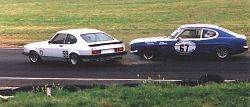
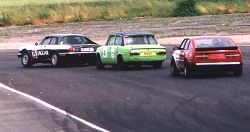
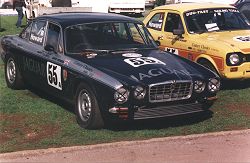
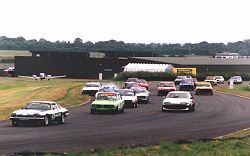
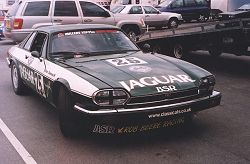
|




